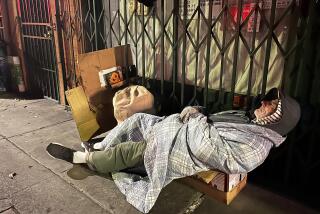Judge’s ruling pleases gay couple
- Share via
Brad Levenson and Tony Sears spent Thursday fielding congratulatory calls from gay rights supporters around the nation for their success in getting a federal judge to call into question the legality of the 1996 Defense of Marriage Act.
Judge Stephen Reinhardt of the U.S. 9th Circuit Court of Appeals ruled earlier this week that Sears -- who married Levenson, a deputy federal public defender, last July -- is entitled to the same spousal benefits that heterosexual couples employed by the department receive.
But the Silver Lake couple aren’t celebrating yet.
“I’m not convinced this is over,” Levenson said of their long-running battle to be treated like a married couple. “But it pushes the conversation forward.”
Reinhardt’s ruling branded the Defense of Marriage Act unconstitutional. The 9th Circuit’s chief judge, Alex Kozinski, also weighed in on the subject last month, granting benefits to the same-sex spouse of a staff attorney for the court. But he stopped short of basing that decision on constitutional grounds.
Despite the prominence of the two judges, the rulings are legally meaningless for all but the two couples because they came in the court’s administrative dispute process, rather than in lawsuit judgments.
The 9th Circuit judges ruled in their capacity as dispute-resolution officials within the federal judiciary, whose employees are prohibited from suing in federal court.
Levenson and Sears see Reinhardt’s order as a step along the road to equality.
But Levenson pointed out Thursday that his attempt to file a new benefits form was rejected by an office computer still programmed to exclude same-sex spouses from even applying.
Reinhardt and Kozinski heard arguments from the two lawyers denied coverage for their spouses, and both raised constitutional issues despite ruling on different grounds. Kozinski said the federal statute was vague about whether benefits could be extended to someone who wasn’t a family member and ruled that 9th Circuit staff lawyer Karen Golinski’s spouse should be covered.
Reinhardt, in ruling on Levenson’s challenge, deemed the government’s denial of benefits for Sears blatant discrimination.
“The denial of federal benefits to same-sex spouses cannot be justified simply by a distaste for or disapproval of same-sex marriage or a desire to deprive same-sex spouses of benefits available to other spouses in order to discourage them from exercising a legal right afforded them by a state,” Reinhardt wrote in an order to the U.S. Courts administration to submit Levenson’s benefits election form.
The Defense of Marriage Act was passed by the Republican-controlled Congress 13 years ago and signed into law by President Clinton. It prohibits the federal government from recognizing gay unions as legal marriages. In combination with another federal statute, the act denies benefits -- accorded to heterosexual couples -- to gay spouses of federal employees.
With same-sex marriage legal or recognized in only a handful of states and on hold in California since the passage of Proposition 8 in November, the number of cases similar to the two lawyers’ is probably small.
But legal analysts see the judges’ orders as an indication that the Defense of Marriage Act is unlikely to stand up to the constitutionality test if it reaches a federal court. They also predict that the decisions will put pressure on the Obama administration to repeal the act as an unjust denial of rights to gay citizens.
“These are nonbinding opinions, but I think they relate back to California in a couple of ways,” said Brad Sears, executive director of the Williams Institute at UCLA, which researches sexual-orientation law.
“The factual issues in the cases underline the importance of recognizing same-sex marriage in California for families to get health insurance, the kinds of things that could be taken away if [Proposition 8] is applied retroactively,” Sears said.
Officials of the Alliance Defense Fund, which supported Proposition 8’s ban on gay marriage, did not respond to an e-mailed request for comment.
The 18,000 gay couples who married in California last year make up the largest same-sex marriage community in the world and will be stirring constitutional challenges until and unless the laws seeking to deny them rights are repealed or ruled unconstitutional, said Brad Sears, who is not related to Tony Sears.
The California Supreme Court will hear arguments next month ahead of its expected ruling in late spring on the constitutionality of Proposition 8. The court will also consider the legal status of the same-sex marriages that occurred before the proposition was approved by 52% of voters.
“I think that this is a very important case in terms of the application of the Constitution to sexual-orientation discrimination, especially with regard to partners,” said Erwin Chemerinsky, dean of the UC Irvine law school.
Questions about the constitutionality of the federal statutes have been raised in a few court cases since gay marriage was legalized in Massachusetts in 2003, but none required judges to rule on the constitutional issues.
Courts are governed by “a well-established principle” that they shouldn’t make decisions on constitutionality unless necessary, Chemerinsky said, explaining Kozinski’s reach -- some would say contortion -- in finding other justification for ordering benefits to Golinski’s spouse, Amy Cunninghis.
Relaxing at home after a frenetic day of calls from well-wishers and warnings about obstacles yet to come, Levenson and Tony Sears reflected on the uncertainty surrounding their marriage as they wait for the state high court judgment.
“We’ll never take our rights for granted again,” said Sears, a 45-year-old photographer, who blames supporters of gay marriage for assuming that Proposition 8 would not pass.
“I’d do a lot more next time around,” added Levenson, 49. “Gays and lesbians have to be a lot more on their game.”
--
More to Read
Sign up for Essential California
The most important California stories and recommendations in your inbox every morning.
You may occasionally receive promotional content from the Los Angeles Times.











